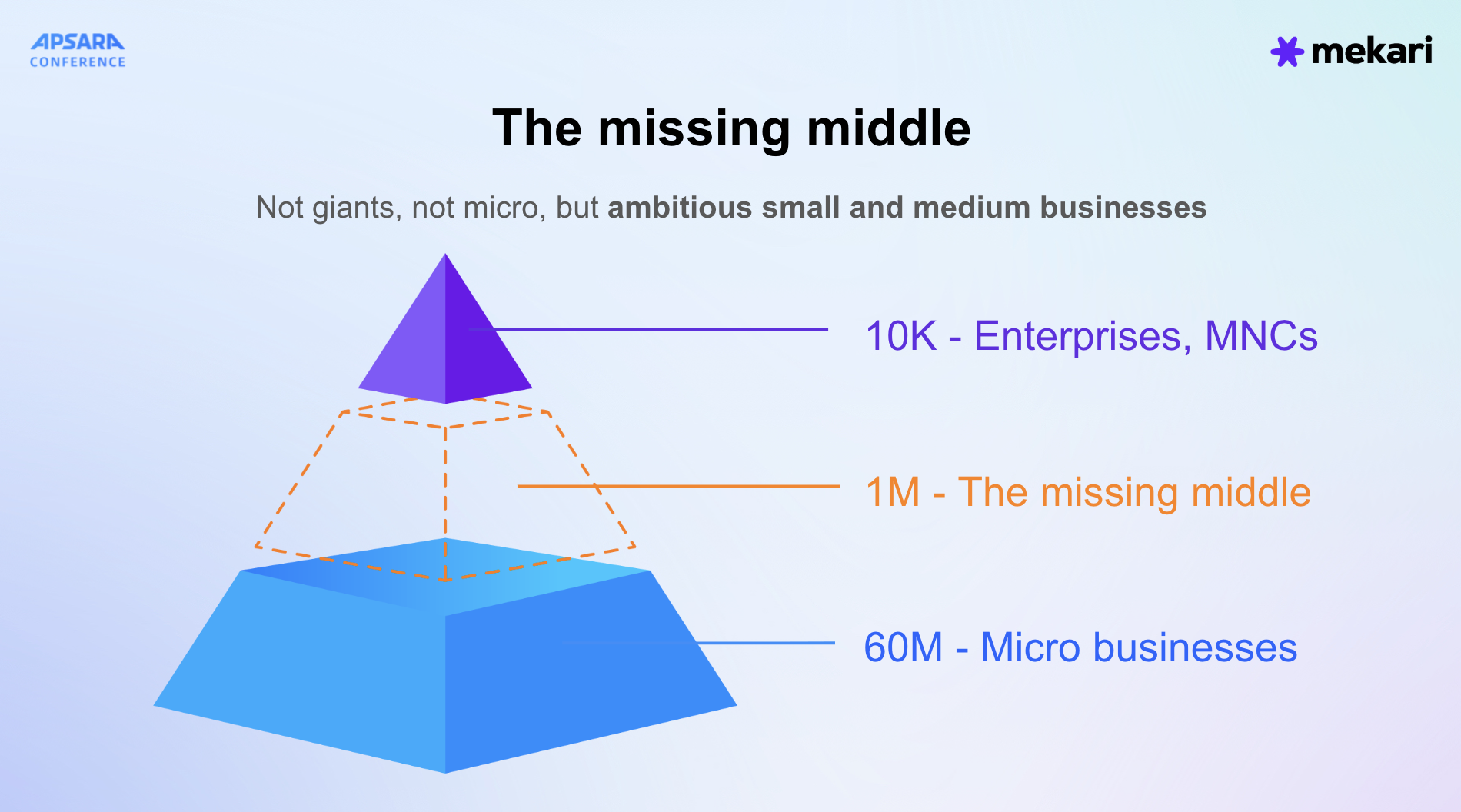Indonesia is the 16th largest economy in the world and a member of the G20. By 2035, economists project we could be among the top ten economies globally. The drivers are clear: domestic consumption and resilient entrepreneurs.
There are more than 60 million registered businesses in Indonesia. At the top of the pyramid are around 10,000 large enterprises and multinationals—productive, efficient, and well-resourced. At the bottom are tens of millions of micro businesses, often family-run, operating in survival mode. They are born out of necessity rather than opportunity. Owners and workers typically put in long hours, yet their earnings remain below average employees in larger companies.
Between these two extremes lies a critical segment: small and medium businesses (SMBs). They employ more than 25 million Indonesians, yet their economic impact is far below their potential. We call them the missing middle. They should be absorbing talent, lifting people out of micro-business survival, and powering prosperity. Instead, they are constrained.

Why? The missing middle faces what we call a ceiling problem. These businesses have grown beyond spreadsheets and manual processes, but they cannot afford the enterprise-grade systems that multinationals use. Global ERPs like SAP, Oracle, or Odoo are too costly, too complex, and often irrelevant to Indonesia’s local context.
So what happens? They are stuck with fragmented apps: one tool for payroll, another for tax, another for inventory. None of them talk to each other. The result is chaos, errors, and wasted hours.
This is the growth tax—the hidden penalty SMBs pay every day:
- Payroll mistakes that cost money and trust.
- Hours spent reconciling spreadsheets instead of serving customers.
- Missed opportunities because leaders lack visibility into their own data.
It’s like running a marathon with sandbags tied to your legs. No matter how hard you push, progress feels slow. If SMEs cannot scale past this ceiling, Indonesia risks losing one of its most powerful engines of growth.
Building the Productivity Breakthrough
That is why we, at Mekari, made it our mission to empower the progress of businesses and professionals. More than a decade ago, we pioneered software-as-a-service in Indonesia, building localized and accessible tools for HR, accounting, CRM, and tax.
We’ve seen firsthand how transformative this can be. Businesses that once managed payroll by hand are now running smoothly with digital systems. Entrepreneurs who had no access to structured financial reporting now rely on cloud-based accounting to track cash flow.
Today, Mekari supports over 30,000 businesses and 2 million professionals across Indonesia. And we built it all for Indonesia—not imported and retrofitted, but designed around our regulations, our workflows, and our realities.
This journey has proven one thing: technology delivers breakthroughs when it is local, affordable, and relevant.
The Next Phase: AI as Growth Engine
But software is only the beginning. We are now entering a new phase where AI becomes the growth engine.
We’ve already embedded AI into our products. With it:
- Finance teams can reconcile transactions in seconds instead of days.
- Managers can ask, “What does my profit and loss look like this month?” and get answers instantly through conversational analysis.
- HR leaders can automate payroll compliance with BPJS and tax rules, generate HR reports in minutes, and even use AI for candidate scoring to hire the right people faster.
These are not futuristic promises—they are happening today. Accountants, HR managers, and sales leaders are already shifting from firefighting to strategic work because AI is lifting the burden of repetitive tasks.
The next leap is agentic AI. Unlike traditional AI that only answers questions, agentic AI takes action. It can execute workflows end-to-end—managing inventory, processing reimbursements, forecasting sales trends—without human intervention in every step.
For Indonesia’s missing middle, this isn’t just efficiency. It’s survival. It’s the chance to break the ceiling that has held them back for decades. AI can unlock the next wave of productivity, profitability, and prosperity.
And when the missing middle accelerates, so does Indonesia.